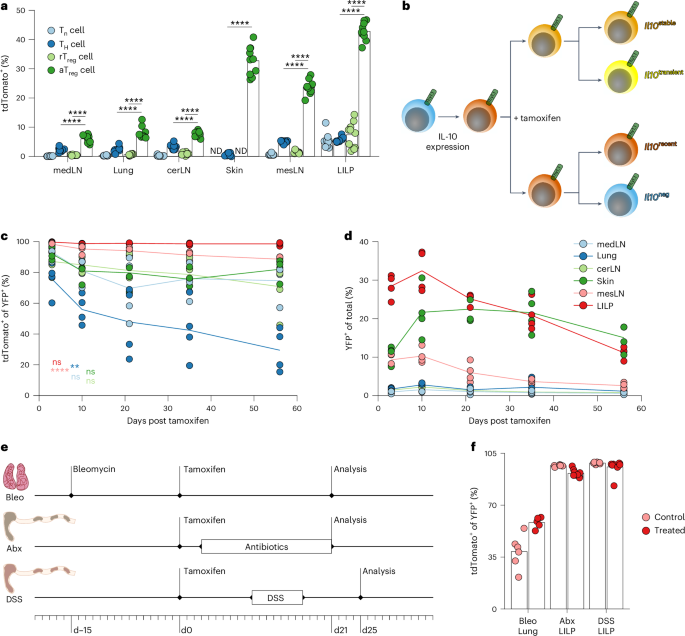Terminal differentiation and persistence of effector regulatory T cells essential for preventing intestinal inflammation
IF 27.7
1区 医学
Q1 IMMUNOLOGY
引用次数: 0
Abstract
Regulatory T (Treg) cells are a specialized CD4+ T cell lineage with essential anti-inflammatory functions. Analysis of Treg cell adaptations to non-lymphoid tissues that enable their specialized immunosuppressive and tissue-supportive functions raises questions about the underlying mechanisms of these adaptations and whether they represent stable differentiation or reversible activation states. Here, we characterize distinct colonic effector Treg cell transcriptional programs. Attenuated T cell receptor (TCR) signaling and acquisition of substantial TCR-independent functionality seems to facilitate the terminal differentiation of a population of colonic effector Treg cells that are distinguished by stable expression of the immunomodulatory cytokine IL-10. Functional studies show that this subset of effector Treg cells, but not their expression of IL-10, is indispensable for colonic health. These findings identify core features of the terminal differentiation of effector Treg cells in non-lymphoid tissues and their function. The authors show that terminally differentiated colonic Treg cells are required for maintaining colonic health and, although these cells are major producers of this cytokine, IL-10 is dispensable for their suppressive function.


对预防肠道炎症至关重要的效应调节 T 细胞的终端分化和持续存在
调节性T细胞(Treg)是一种特殊的CD4+ T细胞谱系,具有重要的抗炎功能。分析Treg细胞对非淋巴组织的适应性,使其具有特殊的免疫抑制和组织支持功能,提出了关于这些适应的潜在机制以及它们是否代表稳定分化或可逆激活状态的问题。在这里,我们描述了不同的结肠效应Treg细胞转录程序。减弱的T细胞受体(TCR)信号传导和大量TCR独立功能的获得似乎促进了结肠效应Treg细胞群体的最终分化,这些细胞以免疫调节细胞因子IL-10的稳定表达为特征。功能研究表明,这种效应Treg细胞亚群,而不是其IL-10的表达,对结肠健康是不可或缺的。这些发现确定了非淋巴组织中效应Treg细胞终末分化的核心特征及其功能。
本文章由计算机程序翻译,如有差异,请以英文原文为准。
求助全文
约1分钟内获得全文
求助全文
来源期刊

Nature Immunology
医学-免疫学
CiteScore
40.00
自引率
2.30%
发文量
248
审稿时长
4-8 weeks
期刊介绍:
Nature Immunology is a monthly journal that publishes the highest quality research in all areas of immunology. The editorial decisions are made by a team of full-time professional editors. The journal prioritizes work that provides translational and/or fundamental insight into the workings of the immune system. It covers a wide range of topics including innate immunity and inflammation, development, immune receptors, signaling and apoptosis, antigen presentation, gene regulation and recombination, cellular and systemic immunity, vaccines, immune tolerance, autoimmunity, tumor immunology, and microbial immunopathology. In addition to publishing significant original research, Nature Immunology also includes comments, News and Views, research highlights, matters arising from readers, and reviews of the literature. The journal serves as a major conduit of top-quality information for the immunology community.
 求助内容:
求助内容: 应助结果提醒方式:
应助结果提醒方式:


